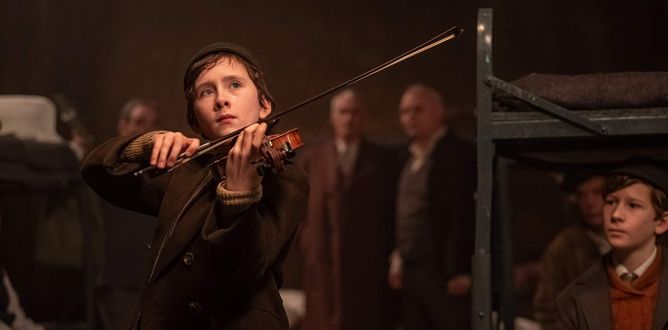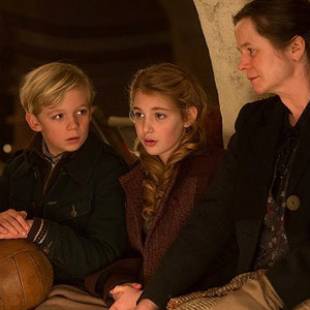The Song of Names Parent Guide
This is a magnificent film, a poignant, eloquent story of love, grief, loss, and identity.
Parent Movie Review
It’s 1951 and Dovidl Rapoport (Jonah Hauer King) is on the cusp of greatness. The gifted young violinist has released a record to rapturous acclaim and his premiere concert has sold out. But as the orchestra and patrons shuffle in their seats, the star performer fails to appear.
Dov’s disappearance is devastating to his adopted English family. His Polish father (Jakub Kotynski) brought him to England prior to the war for safety and musical education and entrusted him to the care of music publisher Gilbert Simmonds (Stanley Townsend). Gilbert’s son, Martin (Misha Handley) and Dov (played as a child by Luke Doyle) are initially combative before becoming as close as brothers. But when his bankrupt and devastated father dies shortly after the abortive concert, Martin is left with grief, anger, and questions that won’t rest.
Thirty-five years later, a middle-aged Martin (Tim Roth) sees a young violinist follow the same pre-performance ritual as his erstwhile brother. Jolted into the past, Martin realizes that Dov must be alive and sets out on a journey through his memories and across the world to find him and solve the mystery of his disappearance.
The Song of Names is a magnificent film; a poignant, eloquent story of love, grief, loss, and identity. All six actors who portray Dov and Martin across their life spans bring authenticity and passion to their roles. And Howard Shore’s deeply emotional musical score gives the film a soul that breathes, sings, and weeps. This is not a story that will leave viewers unmoved. It peers deeply into the core of our humanity: our love for family, our need to belong, the strength of community, and the power and dignity that come from the remembrance of those we’ve lost.
Given the film’s subject, parents will be relieved to note that negative content is comparatively minor and sanitized. Although World War II and the Holocaust are critical themes in the story, no graphic violence appears on screen. The effects of these horrific events are the central theme of the movie, which is permeated with loss and grief. Some parents may object to the playing cards with naked women on them, which are briefly seen, or to the three sexual expletives that comprise the film’s swearing. And they might be unhappy with the show’s ubiquitous smoking, especially when the boys sneak off to smoke cigarettes. But none of this content is extreme and this movie is certainly suitable for most teens.
In fact, The Song of Names isn’t just suitable for teens, it’s exactly the kind of film they should see. In its unsparing look at the price of hate; in its deep dive into the dark well of anguish and grief, this movie has the ability to help teens develop empathy for those who suffer. And hopefully it can inspire all of us to say “never again” and commit to building a world where weaponized hate and its bitter fruits are inconceivable.
Directed by Francois Girard. Starring Tim Roth, Clive Owen, and Catherine McCormack. Running time: 113 minutes. Theatrical release January 10, 2020. Updated April 6, 2020Watch the trailer for The Song of Names
The Song of Names
Rating & Content Info
Why is The Song of Names rated PG-13? The Song of Names is rated PG-13 by the MPAA for some strong language, brief sexual material, thematic elements, and smoking.
Violence: A boy steals a milk bottle. Boys push and shove each other. Boys pretend to have a fist fight in slow motion. There is mention of war, an invasion, and fighting. Air raid sirens go off. A boy goes into a bombed out house and sees a dead woman: only her arm and a small amount of blood are visible. He steals a bracelet from off her arm. A boy mentions a firing squad. There is repeated mention of the people who died in concentration camps but there is no detail about their suffering. A man uses a knife to cut the tassels off his prayer shawl and destroy his skull cap while condemning God. A man punches another man repeatedly in the face: some blood is shown.
Sexual Content: Young boys play with cards that have pictures of naked women: the cards are briefly visible. They discuss the women’s bodies using slang anatomical terms. A boy is teased about spying on a woman who is undressing. A slang term for masturbation is used. A young man tells another one to “get laid”. A man and woman kiss on a few occasions. There is mention of a prior sexual relationship between an unmarried couple; no detail.
Profanity: A main character uses three sexual expletives in a moment of great anger. A handful of crude words are used.
Alcohol / Drug Use: Main characters smoke frequently throughout the film. Young boys are shown clandestinely smoking cigarettes. A husband and wife drink wine together on a few occasions. Characters are shown drinking socially: they appear to have had too much to drink but are not obviously intoxicated.
Page last updated April 6, 2020
The Song of Names Parents' Guide
What is the cost of remembering? What is the value?
United States Holocaust Memorial Museum: Video: Why We Remember the Holocaust
BBC: Holocaust Memorial Day: What can we learn?
FJMC: Why We Remember. Never Forget.
Remembering history is critically important, but the Polish government is legislating against those who would challenge its sanitized whitewash of World War II and the holocaust. For more information about this troubling development, read these articles.
BBC: Poland’s Senate passes controversial Holocaust bill
Time: Poland’s Censorship Law Ignores Its History and Undermines Its Future
The Guardian: Poland can’t lay its Holocaust ghosts to rest by censoring free speech
The Guardian: The populist rewriting of Polish history is a warning to us all
The Song of Names is the first feature film granted permission to shoot at the Treblinka memorial. To learn more about the horrors of Treblinka, click on the following links.
Wikipedia: Treblinka extermination camp
Holocaust Encyclopedia: Treblinka
To learn more about the Holocaust, check out these links.
United States Holocaust Memorial Museum
Vad Yashem: The World Holocaust Remembrance Center
Loved this movie? Try these books…
This film is based on Norman Lebrecht’s award winning novel, The Song of Names.
In The Cellist of Sarajevo, a musician vows to play Albinoni’s Adagio every day for twenty two days as a memorial for those who died in an attack. Author Steven Galloway creates a powerfully moving novel that combines music, memorable characters, and the horrors of war in an unforgettable story.
As German shells rained down on Warsaw in 1939, Wladyslaw Szpilman played Chopin on air: the last broadcast by Polish Radio. Surviving the Nazi occupation, Szpilman wrote his memoirs, The Pianist: The Extraordinary True Story of One Man’s Survival in Warsaw.
In 1945, one of the few survivors of the Treblinka death camp recorded his unspeakable memories. Translated from the Yiddish, Chil Rajchman’s work is available as The Last Jew of Treblinka.
Elie Wiesel’s Night is the unforgettable tale of a young man’s experience of life in the horrors of Auschwitz and Buchenwald.
Haunted by the unmentionable subject of the relatives who died in the Holocaust and whose absence permeated his childhood, Daniel Mendelsohn determines to find his family’s past. The writer embarks on a quest across Europe and the history and traditions of Judaism to find the story of his missing relatives. The Lost: A Search for Six of Six Million shares what he found.
Home Video
The most recent home video release of The Song of Names movie is March 24, 2020. Here are some details…
When David fled the Nazis in Poland, he came to live with Martin and his family in England. On the eve of his first concert as a celebrated violinist, however, David disappears. Martin spends the rest of his life tracking his “brother”.
Related home video titles:
It’s almost impossible to imagine the number of people killed by the Nazi’s Final Solution. The documentary Paper Clipstells the story of a groups of students in Tennessee who decided to collect six million paper clips so they could envision the scope of the Holocaust and remember those who died.
Why is it so important to remember the most painful parts of our past? In Denial, a historian is sued by a Holocaust denier who claims she has slandered him by treating his claims derisively. This film is a powerful tale of standing up for the truth of the past, even when it is harrowing.
In post-war Germany, people are determined to forget the Third Reich. But when a young prosecutor learns that Nazis are living comfortably, without facing justice, he begins an exploration into the Holocaust that horrifies him in Labyrinth of Lies.
If you enjoyed the haunting music in this film, you will want to watch The Lord of the Rings, which has another moving musical score written by Howard Shore.

